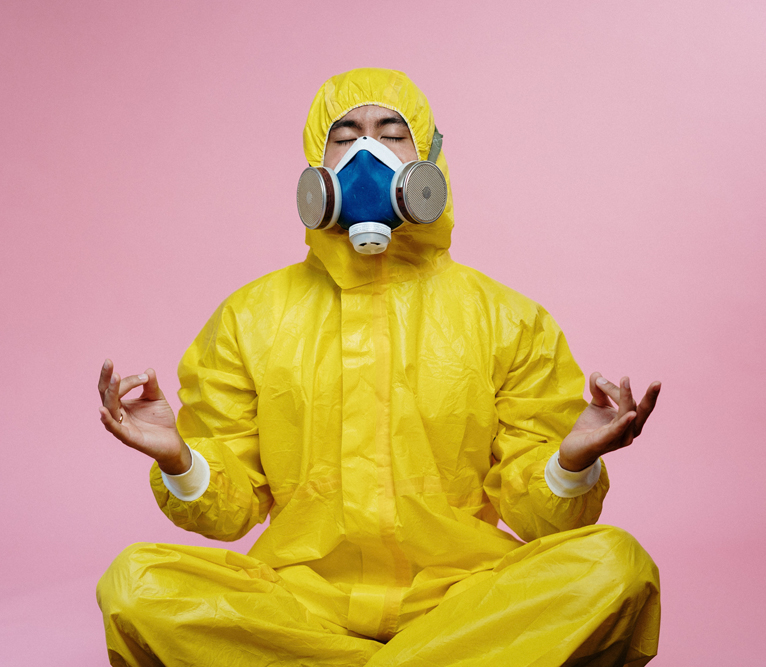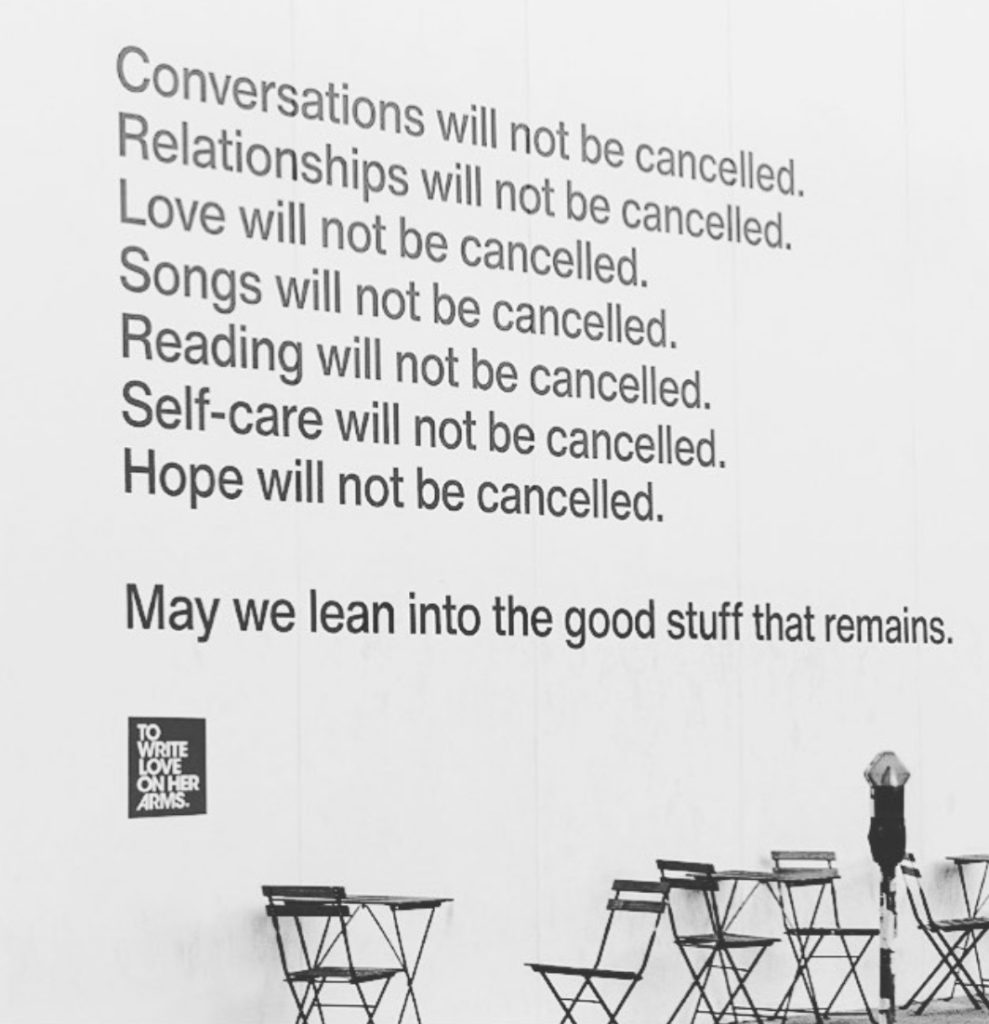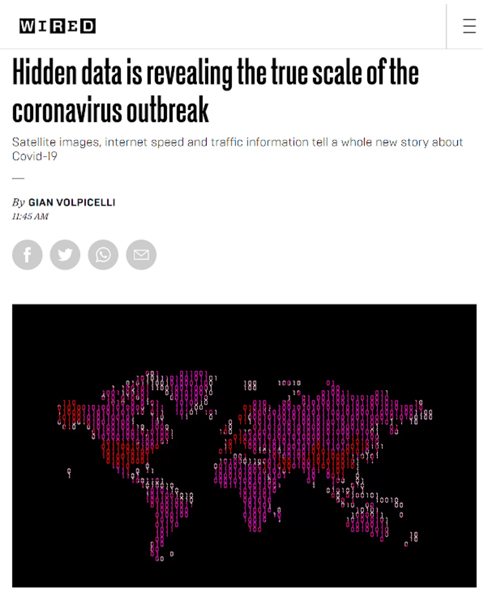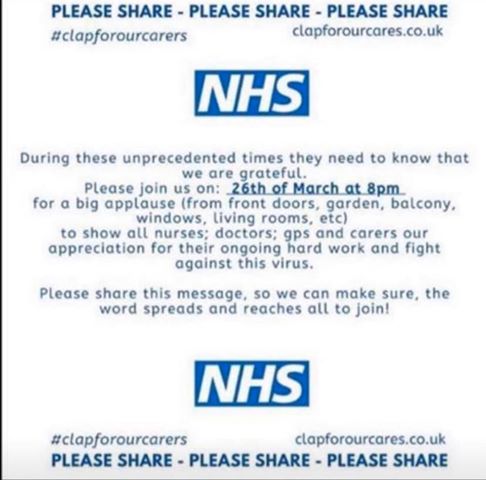
Perspectives on this week’s headlines
By Liza Horan, Editor
Scroll to page bottom to see positive steps to take for strength and solidarity through the pandemic, and post a comment with your ideas, opportunities and resources.
Life today is a test of our flexibility, resilience and persistence. “Social-distancing” and “self-isolation” have worked their ways into our vocabulary, and conversations include talk of friends in quarantine and cities on lock-down. Life will continue shifting as we navigate through crisis-mode.
Since last week, the emphasis of protecting people physically from Covid-19 has shifted to protecting people emotionally and financially, as well as supporting vulnerable populations and those quarantined.
Amid all of this, there is good, bad and sad. Here are the highlights from this past week’s headlines.
THE SAD

The numbers of cases climb each day as the economic figures dive.
Human suffering: About 235,000 cases of coronavirus have resulted in nearly 10,000 deaths across 176 countries as of today, according to the World Health Organization’s situation dashboard. The emphasis remains limiting viral spread, which practically means not being in close proximity with others. Some people may carry the virus yet not experience symptoms, and those with underlying health conditions (like diabetes and pregnancy) or weakened immune systems (like the elderly) are at greater risk for surviving the virus. But it’s also happening to healthy 40-somethings; here’s a reality check on the sudden onset of acute respiratory distress syndrome leading some patients to become unresponsive or go into respiratory failure.
And young people are not immune: The Centers for Disease Control’s analysis of age groups show 20% of infected people aged 20-44 have been hospitalised. Details on STATNews.com. A sad example is a 27-year-old mother who died just days after delivering her baby.
All of this has ruled out gatherings at public places and transport, shutting down schools and workplaces. Yet some people, like university students on Spring Break in Florida and pub-goers, flout advice.
The majority are sequestered at home — and on the Internet. In fact, trending Internet usage is being viewed as a real indicator of virus spread, according to this story on Wired UK. This “secret” data suggests the number of cases of coronavirus may be much higher than officially recorded and reported.
Overall economic impact: This is a two-fold challenge as whole industries, like travel and in-person services (salon, gyms, etc.) and small businesses are fighting for survival; and wages are threatened or lost for employees made redundant and many self-employed workers. The U.K. government pledged to pay up to 80% of wages (up to £2,500 per month) to those not working yet still on payroll. The U.S. is taking a similar, though seemingly less generous, path.
Impact to wellness industry: The pandemic has put health as the world’s #1 priority, so sales of first aid supplies, supplements, and online solutions for physical and mental health are booming. Vanity Fair‘s Kenzi Bryant puts it this way: “I have not stopped thinking about my health for two weeks. It’s the first thing I think about when I wake up and the last thing I think about at night … The wellness industry—collectively the products and services that promise to improve the mind, body, and spirit—has been thinking about my health too.” She does a thorough job of explaining the opportunity for the wellness sector and cautions against those making unfounded claims.
The Telegraph has a great round-up of the impact to major industries, including fitness, and Welltodo’s analysis focuses on the food and beverage sector of wellness.
“Financial advisers expect several small and midsized gyms to close if the pandemic lasts for months, and several cast doubt on the ability of equipment manufacturers such as Peloton, Mirror and Tonal to keep up with a possible surge of demand given the potential difficulty in sourcing and delivering equipment,” the Financial Times’ Eric Platt and Andrew Edgecliffe-Johnson wrote in this story. “But some … noted the increased consumer appetite to stream workout classes on to a phone, laptop or television while gyms were closed.”
IHRSA, the trade association for the health and fitness industry, has pulled together resources for clubs to get through the pandemic crisis. They’re also appealing to make governmental stimulus packages include the fitness industry.
THE BAD
Fear is driving overwhelm and panic, evident in some peoples’ behaviour. Surprising to hear that before the pandemic 75% of Americans said they would cooperate with others in a crisis. Is that figure holding steady now that we’re in one?
U.S. politicians secretly dump stocks: Upon learning about the virus’ early impact in China, American officials sold off their stock — an illegal move as the information was not shared publicly. “The chairman of the Senate Intelligence Committee warned a small group of well-connected constituents three weeks ago to prepare for dire economic and societal effects of the coronavirus,” according to a secret recording obtained by NPR (National Public Radio in the U.S.).
Me-first hoarding: Scroll through the Facebook Newsfeed and it’s easy to find great examples of bad behaviour amongst shoppers, like this video of high-tension mob scene at an Asda in London, “Food retailers have warned riots and civil disobedience could break out within weeks if production is unable to keep up with demand,” that Telegraph story reads.
Some large stores have even called in policy and hired security guards. Even seagulls and monkeys are getting aggressive as they search for scraps amid near-desolate streets.
Gun sales up in U.S.: Yep, people are arming themselves in case of widespread panic and food shortages.
Nature is not quite bouncing back: The social media posts about dolphins and swans returning to Venice turned out to be inaccurate, according to National Geographic. While it’s true the city’s water looks clearer due to the drop in motorboat activity, swans are regularly seen there. Believing it “could help give us a sense of meaning and purpose—that we went through this for a reason,” said Erin Vogel, a social psychologist and postdoctoral fellow at Stanford University. “In times when we’re all really lonely, it’s tempting to hold onto that feeling, especially if we’re posting something that gives people a lot of hope.” Still, with mass transport at a standstill, we’ve severely cut pollution. That’s a positive.
THE GOOD
Despite the too-real hardships that coronavirus is presenting, there are signs of hope for treating the virus and great efforts of kindness, locally and internationally. The positive side of this unfortunate experience is the realisation that we are in it together. It is a collective experience, as these examples highlight.
Promising treatments and vaccines: Global researchers are focused on testing effective treatments for Covid-19 (anti-malarial chloroquine, anti-Ebola drug remdesivir, HIV drug Kaletra, and monoclonal antibodies) and vaccines. STAT has pulled together this vaccine testing round-up and in April Oxford University researchers will begin testing a Covid-10 vaccine on humans and animals. Animal testing usually precedes human testing, but the early human testing is for safety and similar vaccines have been approved so safety is not compromised. If the vaccine passes the initial safety test, it will proceed to a larger study this summer and result in a vaccine ready for public distribution toward the end of the year.
Financial support effort: In an unprecedented move, the World Health Organization has launched Covid-19 Solidarity Response, which enables both private citizens and public and private organisations to donate funds to support needs caused by the pandemic. “We are at a critical point in the global response to COVID-19 – we need everyone to get involved in this massive effort to keep the world safe,” said Dr. Tedros Adhanom Ghebreyesus, WHO Director-General. “We are immensely grateful to the UN Foundation and the Swiss Philanthropy Foundation for coming forward to help us set up this fund. A lot of people and institutions have been saying they want to contribute to the fight against the novel coronavirus. Now they can.” Details here.
Grocery stores are hiring: To keep up with demand, most grocery chains are increasing their capacity for deliveries and adding staff across operations. Major chains are reserving their first open hour for medical staff and vulnerable members of the community. Here are Edinburgh area opportunities, many with immediate start dates.
Emotional response: Mental health quickly was named a priority as social distancing and isolation puts people at further risk of anxiety, stress, and depression. The response from the NHS and the mind-body-spirit sector has been swift. Live-streamed meditations, chants, yoga classes and online meetups (and happy hours!) are happening, and many are free of charge. See below and add more by commenting.
Communities are bonding: While governments order us to be apart, neighbours are trying to figure out how to come together for locals in need and in moral support for each other. Here’s a slew of stories from across the U.K. and U.S. Even rival newspapers came together to remind readers they’re committed to their communities.
Working from home: People are being creative about adapting their personal spaces to be efficient for work — and generous with tips. Tips on how to work from home are abundant and include apps and rituals. Some include getting dressed as if you’re going to the office, keeping things interesting by changing rooms during the day, or carving out a special work zone and keeping it tidy and off-limits to others.
Here are some positive steps we can all take for strength and solidarity:
- WellSet’s free two-week online wellness festival: It starts Sunday, 22 March. Review all the sessions and RSVP.
- Free live daily meditations led by Andrew Johnson, who was our guest on The Mindstream Podcast (Facebook, 8 a.m. GMT, Instagram 8:30 a.m. GMT).
- Free online chant led by Katie and Francesco of Inner Cheile (Sunday, 22 March: Facebook, 6:30-8 p.m. GMT/2:30-4 p.m. ET).
- Mother Meera is livestreaming a daily darsha.
- Get reading or writing: Mind-body-spirit publisher Hay House is offering 50% off on books and journals. They’ve also pulled together a list of free resources.
- Applaud NHS staff on Thursday, 8 p.m. GMT, by heading out your door or opening your window. Clap for Our Carers is a national action to thank the UK medical teams for their work through the pandemic.
- Support the Red Cross: Register your interest in helping your local community by signing up with the British Red Cross Reserves. The American Red Cross is seeking blood donors and volunteers to deliver services.
- Connect with your neighbours through online apps, like NextDoor (U.K., U.S.) and OnHand (London only so far). People are offering their help to neighbours in need and are trying to mobilise their micro-communities.
In other natural health news, two recent medical studies reveal natural cancer inhibitors. Cannabinoids reduce brain tumour growth in mice, according to research published in the European Journal of Pharmacology. Melatonin, a hormone produced by the pineal gland, has anti-tumour effects. A research study, published in Annals of Clinical & Laboratory Science, focused on esophageal cancer. Melatonin is popularly known to help reduce jetlag and improve sleeping disorders because it supports circadian health, which is based on aligning our wake and sleep times with daylight.
Challenges require a lot from us, and they bring opportunities, too. Remember to be kind to each other and to ourselves as we adjust to this new (and hopefully very temporary) way of conducting daily life.
Please post a comment below to share your ideas, resources or apps on how we can collectively make a difference in our community, or any great tips or tools to making the most of this situation.




Comments